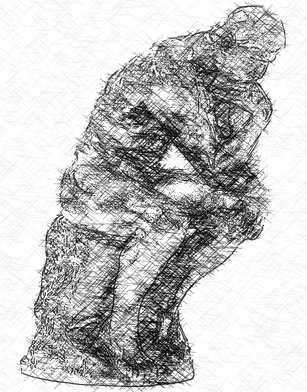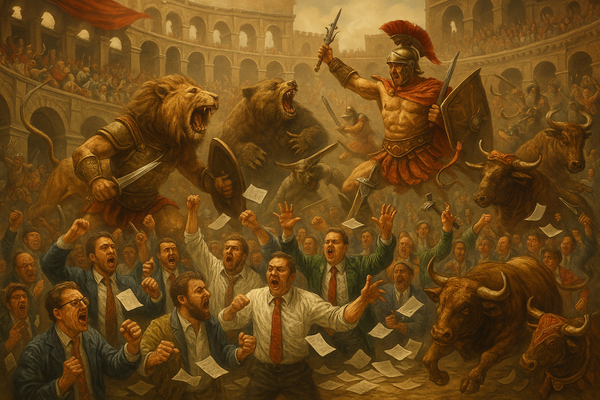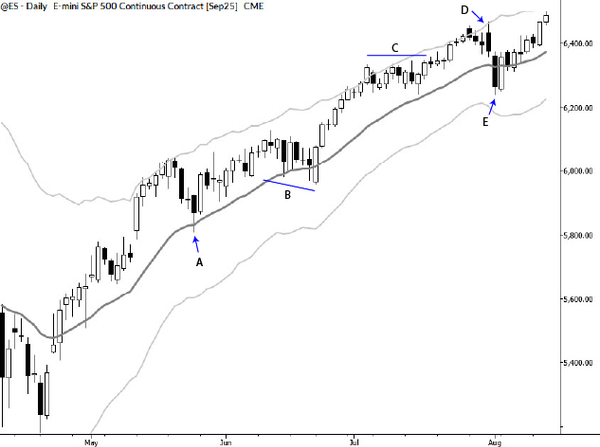Thinking about Thinking: Probability and Psychology in the Markets

This is a followup to my recent blog post on strings of losses in trading systems. I ended that blog with a promise to consider how the probabilities affected our behavior, and I’ve been swamped with requests to write this post! This is a good topic, and one that obviously generates some interest, so let’s dig in.
Trading is hard. We know this. We also have a pretty good idea why it’s so hard. There are many reasons, but, to my way of thinking, they center around two areas:
- Objective edges in markets are very small. The only way to apply them is over large samples and with consistency.
- Human psychology interacts with the market environment in some weird ways that make all this harder than it has to be.
As for the second point, I think there are many reasons why our psychology is so poorly tuned for trading, but two reasons jump out:
- Evolution probably favored cognitive development of paranoia, pattern recognition even when patterns are false, and immediate action. There was probably no evolutionary advantage to being able to understand probability and randomness, so it’s not part of our natural cognitive framework.
- Financial markets evolve and have evolved out of the competitive actions of many market participants. This creates an environment in which our normal actions will naturally be turned against us by “the market” (which is nothing more than the sum of all the actions of all market participants.)
I made those bullet points, but I they hold some of the deepest truths I’ve learned in over two decades of trading. I’d submit that both of those points are worth your careful consideration, but let’s look at a few practical ways that our brains can “misfire” and cause us to do the wrong thing in the markets.
String of losses
This was the topic of that previous blog, and we can summarize it very easily: random data has more runs (in trading, of both good and bad things) than we expect. Because runs “feel” wrong to us, we tend to make some mistakes.
First, a string of winners can easily lead to overconfidence and to taking too much risk on the next trade. Traders can feel euphoric and invincible, or, at the very least, have an inflated opinion of their own skill when really it’s nothing more than a natural, lucky run.
A strong of losses can cause just the opposite. In addition, many trading educators do not properly understand randomness and tell developing traders to spend a lot of time in trade review and to look to modify trading plans after runs of wins and losses.
You can’t remind yourself often enough that all of this is highly random and noisy. If you understand your win rate and have some idea about the stability of your system (a legitimate point that was raised in the comments to my previous post) you can make some informed decisions about what you should do.
Are you 20 trades in to trading a new system and you’ve had 5 losers in a row? Well, that situation would be very different than if you were 100 trades in and had a run of 5 losers, and the way you deal with it should be different.
Other mistakes
Other mistakes might not be so much related to runs in probability, but they are worth considering:
- We tend to get fear and greed wrong. Left to natural inclinations, most traders would tend to get fearful when they should “push the gas” a bit, and tend to get very aggressive when they should be more cautious. This is one reason why beginning traders often note that someone could make money just doing the exact opposite of what they do. You’re not imagining it! (And you’re also not hopeless—this is all normal.)
- The extreme misfire of aggression comes when a trader goes “on tilt”. An active trader can easily destroy an account in a single day. I sat beside a trader who had traded professionally for years. One day, he had an unfortunate alignment of personal issues and market action, completely destroyed his trading account and went negative, ended up out of the business and had to sleep in a friend’s basement. There are real-life consequences to trading mistakes.
- We attach significance to things that are not important and miss important things. Traders often imagine someone is hunting for their stops or that the market is out to get them. This is another way that our beautifully tuned cognitive tools hurt us in the market. It’s useful to be able to walk into a room and get a feel for whether people like you, whether it’s safe, or dangerous. When we apply that same sense to the market, we often think the government is trying to hunt our stop orders and that THEY always get us.
How to “fix” yourself
Ok, the bad news first: you can’t “fix” these things. They are such a fundamental part of how you see the world and how your brain works that you can’t change them.
But the good news is you don’t have to. Successful traders struggle with these same issues, even after decades of trading. You can be successful with these cognitive errors and biases, but you can’t let them shape your behavior.
And there, I think, are the answers: you need to understand the issues intellectually. You need to shape your behavior with a strong influence of your rational, analytic side. Do not be blind to emotion and don’t try too hard to repress it. (Indeed, there are traders who are, shall we say, impressively emotional and make their emotions part of their process in a constructive way.)
The goal is not to eliminate emotion and become a machine. The goal is to discipline your behavior, to be aware of your potential limitations and errors you will be inclined to make, and to work to apply your edge with more consistency in the market.
If you’re a beginning trader, thinking about the impact of strings of wins and losses is a pretty good place to start. Go back to that previous post and consider how likely you are to have 3 or 4 or more winning trades in a row. How will you feel after that? How should you feel? Now what if they were losers?
Investigating emotions and cognitive biases from a rational perspective might just be the first step in managing our behavior and strengthening our psychological perspective.
(I am working on the psychology module of my completely free trading course and will publish it soon. If you haven't started the course, this is a great time to start so you can be ready for that module when I publish!)



